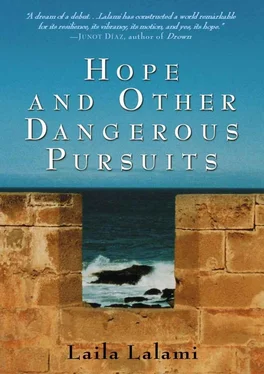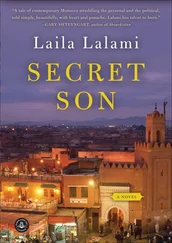“Try something else,” Lahcen said, as he lit his cigarette.
“Like what?”
Lahcen shrugged. “Look at me. I get by.” He had invested four hundred dirhams in a few phone cards, and he resold individual minutes at a higher price to people who wanted to make calls at pay phones. He worked out of the central post office in downtown Casablanca. His net gain was tiny, but it paid for his bus fares and his cigarettes. Besides, he declared that he liked it this way, that he always charmed people into buying from him, so he didn’t mind the competition from the other phone-card sellers, whether men, women, or children.
“It’s different for you. You’re single.”
“Then why did you get married?”
“What?”
Lahcen pulled on his cigarette. “If you hadn’t married, you wouldn’t have to do this.”
Aziz clicked his tongue. “Leave my wife out of this.”
“I’m just saying.”
“What do you want me to do? Sell minutes like you?”
“At least I’m doing something. And I don’t even have a diploma, like you.” The diploma in question was a piece of paper that lay in a folder by Aziz’s bed, gathering dust. Both Lahcen and Aziz had flunked their high school exams a few years back, and so they’d been unable to get into a university. Lahcen had started his phone-card operation, but Aziz had gone to trade school, and after two years he was given a degree in automation — which basically meant he could work as a repairman. He hadn’t found work.
“Diploma or no diploma, makes no difference.”
“You talk like that because you have one.”
Aziz sighed. “What is it with you today?”
“I should be asking you that, my friend. You come to me, telling me you’re going to get on a boat, risk your life to go to Spain, where you’re probably going to get caught anyway, and you want me to congratulate you?”
This version of Aziz’s future was one he’d heard before from his parents. They’d warned against the best (a farm job for slave wages!), the worst (a horrible death!), and everything in between (a life of inescapable delinquency!). But he had weighed their warnings against the prospect of years of idleness, years of asking them for money to ride the bus, years of looking down at his shoes or changing the subject whenever someone asked what he did for a living, and the wager seemed, in the end, worthwhile. “Do you have an extra cigarette?” he asked.
Lahcen handed over his pack of Olympique Rouge. “Look, maybe I can help you.”
Aziz lit his cigarette and took a long pull. The creaking sound of the door being opened behind them made them turn around. Hakima poked her head out and asked if they were coming in for dinner. Lahcen waved at her and said they’d be in soon. “Go get some bread,” Hakima said. “We’re out.”
Lahcen and Aziz got up and walked to the store, dragging their feet. It was cloudy outside and the wind had picked up. They crossed an empty lot where children played football under a rising cloud of red dust. The piceri had sold most of its bread for the day and had only a few loaves left. Lahcen carefully selected the best-looking one and handed a bill to the cashier, who looked back and forth at the two men, gave them a nasty look, but took the money nonetheless.
“What’s his problem?” Aziz asked when they left.
“He’s a strange fellow,” Lahcen said. “He doesn’t like people from outside the neighborhood.”
“Ya, what a donkey,” Aziz said. This shopkeeper reminded Aziz of his grandmother, who always seemed to find fault with people she barely knew. She found the mailman, a ‘arobi from the countryside near Casablanca, to be uncultured and uncouth. To the tailor, a Shamali from the north, she granted slightly higher status, but she often commented that he was too crafty to be up to any good. The Chleuh who sold her mint at the market was often the subject of her invectives about avarice. It had gotten to the point that Aziz had started to have some affection for the very people his grandmother would have disapproved of. Aziz told this story to Lahcen, adding a joke or two to cheer his friend as they headed back to the house for dinner.
“HE’S NOSY,” ZOHRA said, frowning. They were walking back home to the medina. Around them, shopkeepers were locking up for the day.
“He’s just concerned,” Aziz said.
“So is everyone else.”
Aziz didn’t answer. He was thinking about what Lahcen had said.
“Do you think he can really do something?” Zohra asked.
Her question was exactly what he feared — that Lahcen’s assurances of help would give Zohra hope, a hope that he knew would eat away at her determination to let him go, a hope he knew would eventually be crushed anyway. He held her hand and gave it a squeeze. “If Lahcen could help,” he said, “he’d have helped himself.”
“You never know,” she said.
THE NEXT DAY Lahcen showed up in a blue double-breasted suit, which he’d purchased from the swap meet at Derb Ghallef, where secondhand American clothes were sold, and which he wore on special occasions. “Where are you headed?” Aziz asked, as he greeted him at the door.
“To a meeting,” Lahcen said. “And you’re coming with me, Ammor.” He closed the door behind him.
Aziz knew that he would have to go along with whatever plan Lahcen had hatched, if only for the sake of his parents, who accused him of not having tried every possible solution before deciding to emigrate. “Fine.”
Lahcen sat down to have tea with Aziz’s parents. He talked about the weather, commented on the latest soccer match, and inquired after their health. Aziz’s father responded with a prompt “Hamdullah,” teasing his false teeth with his finger, taking them off and readjusting them, while Aziz’s mother, a notorious hypochondriac, complained at length about her latest bout of indigestion. Lahcen politely listened, finished his tea, then signaled to Aziz that it was time to go. “Bring your folder,” he ordered.
Zohra ran to the bedroom to get Aziz’s father’s jacket and insisted that Aziz wear it. “For the meeting,” she said.
Aziz put it on and stepped outside to meet his friend. “Where are we going?”
“One of the women who buys minutes from me works for a dentist, and I asked her to talk to her boss about you.”
“What would a dentist want with me?”
“His chair is broken. Maybe you could fix it, and then he can tell his friends about you.”
“That’s not a job.”
“Let me look at your teeth.”
“What?”
“You need to be presentable when you walk into his office.”
Aziz laughed. “You know,” he said, “I appreciate that you’re trying to help me. But this isn’t a job, man. It’s a one-time thing, isn’t it?”
“It might lead to something.”
They took the bus downtown and walked into the dentist’s office just as a patient was leaving, yelling that she’d never come back. Lahcen held the door open for the woman, letting her finish her diatribe against doctors in general and dentists in particular, then walked in with Aziz behind him. He smiled at the receptionist, asking her how her boyfriend was, the one she always called from the pay phone. “He’s fine,” she said, her cheeks turning a light pink. “Have a seat, I’ll let the doctor know you’re here.” She disappeared, and Aziz and Lahcen sat down in front of a coffee table upon which lay three half-torn magazines, all of them about golf. Aziz picked one up and started to read while Lahcen crossed his legs and patted his pocket for his cigarettes without taking them out.
The afternoon wore on, punctuated by the sound of the doorbell, the moans of pain, and the ka-ching of the cash register. When the clock chimed six, Aziz suggested they leave. Lahcen patted his back and said now that they’d waited this long, they could wait a little longer. Finally the last patient left and the dentist stepped out, taking off his lab coat. He looked at the two men with a mix of surprise and recognition in his eyes. “You’re here,” he said.
Читать дальше












